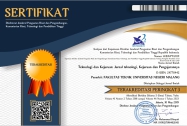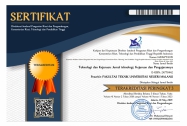Students' Perspective on Collaborative Research-based Learning in Embedded Systems
Abstract
Keywords
Full Text:
PDFReferences
Albar, S. B., & Southcott, J. E. (2021). Problem and project-based learning through an investigation lesson: Significant gains in creative thinking behaviour within the Australian foundation (preparatory) classroom. Thinking Skills and Creativity, 41, 100853. Doi: 10.1016/j.tsc.2021.100853
Ashjaei, M., Bello, L. L., Daneshtalab, M., Patti, G., Saponara, S., & Mubeen, S. (2021). Time-Sensitive Networking in automotive embedded systems: State of the art and research opportunities. Journal of systems architecture, 117(102137), 1-15. Doi: 10.1016/j.sysarc.2021.102137
Behzadan A.H., Kamat V.R. (2013). Enabling Discovery Based Learning in Construction Using Telepresent Augmented Reality. Elsevier Journal of Automation in Construction (Special Issue on Applications of Augmented Reality in Architecture, Engineering and Construction), 33, 3-10.
Beneroso, D., & Robinson, J. (2022). Online project-based learning in engineering design: Supporting the acquisition of design skills. Education for Chemical Engineers, 38, 38-47. Doi: 10.1016/j.ece.2021.09.002
Brew, A., & Saunders, C. (2020). Making sense of research-based learning in teacher education. Teaching and Teacher Education, 87, 102935. Doi: https://doi.org/10.1016/j.tate.2019.102935
Carter, S., Andersen, C., Stagg, A., & Gaunt, L. (2023). An exploratory study: Using adapted interactive research design and contributive research method. The Journal of Academic Librarianship, 49(1), 102620. Doi: 10.1016/j.acalib.2022.102620
Chen, C. M., Li, M. C., & Chen, Y. T. (2022). The effects of web-based inquiry learning mode with the support of collaborative digital reading annotation system on information literacy instruction. Computers & Education, 179, 104428. Doi: 10.1016/j.compedu.2021.104428
Desai, V., & Jariwala, V. (2023). Efficient and linear static approach for finding the memory leak in C. International Journal of Electrical and Computer Engineering, 13(2), 1932. Doi: 10.11591/ijece.v13i2.pp1932-1942
Dwivedi, Y. K., Hughes, L., Kar, A. K., Baabdullah, A. M., Grover, P., Abbas, R., ... & Wade, M. (2022). Climate change and COP26: Are digital technologies and information management part of the problem or the solution? An editorial reflection and call to action. International Journal of Information Management, 63(102456), 1-39. Doi: 10.1016/j.ijinfomgt.2021.102456
Dwivedi, Y. K., Kshetri, N., Hughes, L., Slade, E. L., Jeyaraj, A., Kar, A. K., ... & Wright, R. (2023). “So, what if Chat GPT wrote it?” Multidisciplinary perspectives on opportunities, challenges and implications of generative conversational AI for research, practice and policy. International Journal of Information Management, 71, 102642. Doi: 10.1016/j.ijinfomgt.2023.102642
Espinoza-Figueroa, F., Vanneste, D., Alvarado-Vanegas, B., Farfán-Pacheco, K., & Rodriguez-Giron, S. (2021). Research-based learning (RBL): Added-value in tourism education. Journal of Hospitality, Leisure, Sport & Tourism Education, 28(100312), 1-10. Doi: 10.1016/j.jhlste.2021.100312
Fang, J., & Jacqueline, O. (2023). Embedding sustainable development goals (SDGs) in an undergraduate business capstone subject using an experiential learning approach: A qualitative analysis. The International Journal of Management Education, 21(1), 100749. Doi: 10.1016/j.ijme.2022.100749
H Egbert, V Mertins. (2010). Experiential Learning with Experiments. International Review of Economics Education, 9 (2), 59-66. Doi: 10.1016/S1477-3880(15)30050-5
Hamman-Ortiz, L., & Palmer, D. (2023). Identity and two-way bilingual education: Considering student perspectives: introduction to the special issue. International Journal of Bilingual Education and Bilingualism, 26(1), 1-6. Doi: 10.1080/13670050.2020.1819096
Hang, Y., & Zhang, X. (2023). Intercultural competence developmental processes of university and college students as three types of transition–A systematic review. International Journal of Intercultural Relations, 92(101748), 1-24. Doi: 10.1016/j.ijintrel.2022.101748
Hoque, M. R., Mumu, J. R., Wanke, P., & Azad, M. A. K. (2022). Application of machine learning techniques in chronic disease literature: from citation mapping to research front. International Journal of Industrial and Systems Engineering, 42(2), 193-210. Doi: 10.1504/IJISE.2022.126041
Hughes, S. (2020). My skin is unqualified: an autoethnography of black scholar-activism for predominantly white education. International Journal of Qualitative Studies in Education, 33(2), 151-165. Doi: 10.1080/09518398.2019.1681552
Jäderholm, C., Currier, J., Brown, K., Audett, A., Campbell, L., Blakesley, S., . . . Shannon, J. (2023). The Community Research Liaison Model: Facilitating community-engaged research. Journal of Clinical and Translational Science, 7(1), E78. Doi:10.1017/cts.2023.31
Kabra, G., Ghosh, V., & Joshi, Y. (2023). Factors influencing adoption of cloud computing services in HEIs: a UTAUT approach based on students' perception. International Journal of Business Information Systems, 42(1), 103-122. Doi: 10.1504/IJBIS.2023.128301
Kölemen, Ülkü. (2021). A Systematic Review of Studies on Language Learning Strategies from 1977 to 2018. International Journal of Language and Literary Studies, 3(1), 151–169. Doi: 10.36892/ijlls.v3i1.485
Kopp, T., Kinkel, S., Schäfer, T., Kieslinger, B., & Brown, A. J. (2020). Measuring the impact of learning at the workplace on organisational performance. International Journal of Productivity and Performance Management, 69(7), 1455-1474. Doi: 10.1108/IJPPM-12-2018-0443
Lebele, A. A. (2020). How the Botswana International University of Science and Technology Library Engages its Stakeholders in Connecting Information Resources, Services, and Space. International Journal of Information, Diversity, & Inclusion, 4(3/4), 37–50. Doi: 10.33137/ijidi.v4i3/4.33568
Lindhout, P., Teunissen, T., & Visse, M. (2020). Inarticulate experiences in qualitative health research: bounds and bounty of expression types. International Journal of Qualitative Methods, 19(1609406920978107), 1-14. Doi: 10.1177/1609406920978107
Lipari, M., Wilhelm, S. M., Giuliano, C. A., Martirosov, A. L., & Salinitri, F. D. (2022). A scaffolded problem-based learning course for first-year pharmacy students. Currents in Pharmacy Teaching and Learning, 14(3), 352-358. Doi: 10.1016/j.cptl.2022.01.016
Martín-Blanco, C., Zamorano, M., Lizárraga, C., & Molina-Moreno, V. (2022). The Impact of COVID-19 on the Sustainable Development Goals: Achievements and Expectations. International Journal of Environmental Research and Public Health, 19(23), 16266. Doi: 10.3390/ijerph192316266
McDermott, K., & Ogawa, M.-B. (2023). Leveraging Instructional Modality to Improve Information Literacy Skills. International Journal for Educational Media and Technology, 16(2), 5–13. Retrieved from https://ijemt.org/index.php/journal/article/view/287
Murray, M. M., Kolanczyk, D. M., Phatak, A., Schmidt, J., Kliethermes, M. A., Tran, T., ... & Vest, K. (2020). Barriers to and factors influencing the pursuit of pharmacy student research. Currents in Pharmacy Teaching and Learning, 12(11), 1297-1303. Doi: 10.1016/j.cptl.2020.06.007
Mouza, C., Codding, D., & Pollock, L. (2022). Investigating the impact of research-based professional development on teacher learning and classroom practice: Findings from computer science education. Computers & Education, 186, 104530. Doi: 10.1016/j.compedu.2022.104530
Narassima, M. S., & Vasudevan, S. K. (2023). A novel statistical approach to an event management-a study and analysis of a Techfest with suggestions for improvements. International Journal of Advanced Intelligence Paradigms, 24(1-2), 49-69. Doi: 10.1504/IJAIP.2023.128074
Nurmalisa, Y., Sunyono, S., & Yulianti, D. (2023). An Integrative Review: Application of Digital Learning Media to Developing Learning Styles Preference. International Journal of Information and Education Technology, 13(1), 187-194. Doi: 10.18178/ijiet.2023.13.1.1795
Potu, B. K., Atwa, H., El-Din, W. N., Othman, M. A., Sarwani, N. A., Fatima, A., ... & Fadel, R. A. (2022). Learning anatomy before and during COVID-19 pandemic: Students’ perceptions and exam performance. Morphologie, 106(354), 188-194. Doi: 10.1016/j.morpho.2021.07.003
Qattawi, A., Alafaghani, A. A., Ablat, M. A., & Jaman, M. S. (2021). A multidisciplinary engineering capstone design course: A case study for design-based approach. International Journal of Mechanical Engineering Education, 49(3), 223-241. Doi: 10.1177/0306419019882622
Salmento, H., Murtonen, M., & Kiley, M. (2021). Understanding teacher education students’ research competence through their conceptions of theory. Frontiers in Education, 6(763803), 1-9. Doi: 10.3389/feduc.2021.763803
Short, A. (2022). Designing narrative for professional development: A programme for improving international health care practitioners’ cultural competence. International Review of Education, 68(4), 601-629. Doi: 10.1007/s11159-022-09972-8
Staddon, R. V. (2023). Exploring higher education students’ perspectives on factors affecting use, attitudes and confidence with learning technologies. International Journal of Instruction, 16(2), 31-52. Doi: 10.29333/iji.2023.1623a
Tietjen, P., & Asino, T. I. (2021). What is open pedagogy? Identifying commonalities. International Review of Research in Open and Distributed Learning, 22(2), 185-204. Doi: 10.19173/irrodl.v22i2.5161
Urooj, S., & Farooq, M. S. (2023). Impact of Students’ Ubiquitous Learning through Web 2.0 Tool on Students’ 21st Century Skills: Creativity and Communication. Research Journal of Social Sciences and Economics Review, 4(1), 125-140. Doi: 10.36902/rjsser-vol4-iss1-2023(125-140)
Vamos, S., Okan, O., Sentell, T., & Rootman, I. (2020). Making a case for “Education for health literacy”: An international perspective. International Journal of Environmental Research and Public Health, 17(4), 1436. Doi: 10.3390/ijerph17041436
Venkatapathiah, S. K., Selvan, S. S., Nanda, P., Shetty, M., Swamy, V. M., & Awasthi, K. (2023). Deep Learning Based object detection in nailfold capillary images. IAES International Journal of Artificial Intelligence, 12(2), 931. Doi: 10.11591/ijai.v12.i2.pp931-942
Younis, A. A., Sunderraman, R., Metzler, M., & Bourgeois, A. G. (2021). Developing parallel programming and soft skills: A Project Based learning approach. Journal of Parallel and Distributed Computing, 158, 151-163. Doi: 10.1016/j.jpdc.2021.07.015
DOI: http://dx.doi.org/10.17977/um031v45i22022p99-105
Refbacks
- There are currently no refbacks.
Copyright (c) 2023 Teknologi dan Kejuruan: Jurnal Teknologi, Kejuruan, dan Pengajarannya
Teknologi dan Kejuruan: Jurnal Teknologi, Kejuruan, dan Pengajarannya
E-ISSN 2477-0442 (online)
Contact
Faculty of Engineering, Universitas Negeri Malang (UM)
Jl. Semarang No 5 Malang 65145, Building H5, 1st Floor.
Homepage: http://journal2.um.ac.id/index.php/teknologi-kejuruan
Email: teknologikejuruan.ft@um.ac.id

This work is licensed under a Creative Commons Attribution 4.0 International License.



2.png)
1.png)
1.png)
1.png)
4.png)
1.png)
.png)

3.png)
1.png)
1.png)


